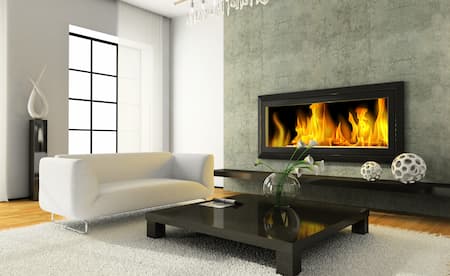All About New Jersey Steam Heating Systems

Heat from steam is a warm wonderful and absolutely fabulous way to heat your Bergen County house. Steam heat is almost always created from water in a boiler fueled by gas, oil or electricity. It then passes through pipes and radiators or convectors to heat your home. A steam heating system uses steam generated from a boiler. When the water boils, the steam rises through the pipes and into the radiators to heat them. The hot radiators then heat your home.
Steam radiators need to have a valve that allows air to escape at a controlled rate so that the radiator can heat up. Steam systems will also lose a little bit of water all the time, so there has to be water makeup so that you do not run your boiler dry. Steam heating systems without an automatic water feeder are not safe. You will risk serious boiler damage should boiler water be lost. If the boiler runs dry it could also explode if water is placed into it while it is hot. There should always be a low water cutoff installed on every steam system. Therefore on a steam boiler the automatic water feeder serves as a safety device also.
Steam Is A Great Heat Distribution Medium
- It moves easily through your system and it has an extremely high heat-holding capacity.
- The heat-holding capacity of steam is much greater than that of water.
- Steam systems often operate at very low pressures and usually under 220°F.
- Steam heat is usually distributed by either one or two pipe systems.
In a case of a one-pipe steam heating system, a single main serves the dual purpose of supplying steam to the heat exchanger and allowing condensate to run back from the radiators also. A two-pipe system has two connections from each heat exchanger or radiator. In this system, steam and condensate flow in separate piping from each other. With a steam system all pipes must be well insulated and you must use pipe insulation rated for steam piping. If the insulation is removed the system will no longer work as designed. Noise and all sorts of problems will come from un insulated piping.
When you have radiators on upper floors or radiators that are further from the boiler they should be adjusted to release more air to compensate for the increased air volume in the piping due to the distance from the boiler. If you have a valve that is clogged with mineral deposits or stuck shut, no air will be able to get out of the piping. Because of this no steam can enter the radiator, so it doesn't heat up. This will block the movement of steam into the radiator, or cause a very noisy hammering as pressurized steam tries to get through this water "dam".
It is very important that you find someone that is very familiar with steam heating systems when repairing or installing steam heating. Incorrectly designed, installed, steam systems and condensate piping is a huge problem in today's buildings and facilities. Martin Masters Plumbing, Heating, & Air Conditioning, Inc. is qualified to design and install properly operating steam heating systems in New Jersey. Incorrect steam piping will always cause costly premature failure of steam equipment such as steam coils, heat exchangers, and control valves. Not to mention the higher cost of operating a heating system that is not working efficiently.
Providing efficient Bergen County steam heating is very easy and will give you hassle-free operation. Steam heat can easily be one of the most efficient and comfortable ways for you to heat your home. The efficiency and comfort of the system are totally dependent upon the quality of your installation or repair. Today it is very difficult to find someone that knows what they are doing when it comes to steam heat. Do not settle for someone that "thinks" they know how to fix or install your steam heating system. Make sure that you call Martin Masters Plumbing, Heating, & Air Conditioning, Inc. the right company for the job.

